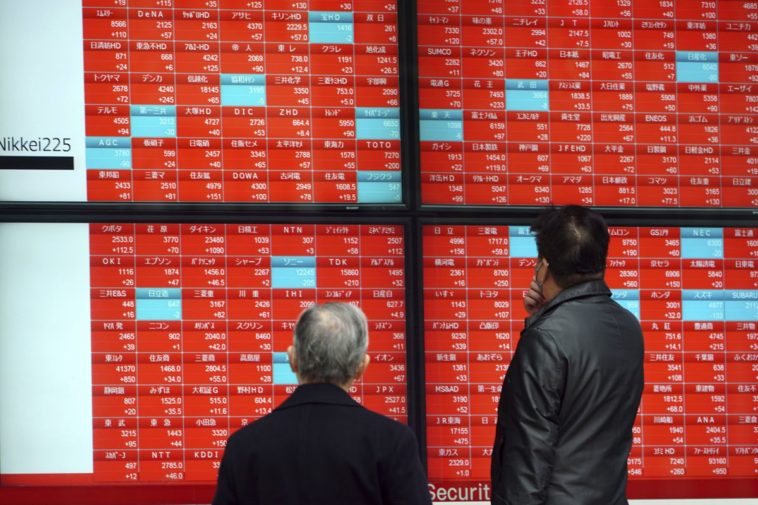The seven events that could derail the market rally
/cloudfront-us-east-1.images.arcpublishing.com/tgam/4PTL3UGEKNJ7NIZ7JHS6W6NJZE.jpg)
Daily roundup of research and analysis from The Globe and Mail’s market strategist Scott Barlow
Credit Suisse’s award winning strategist Andrew Garthwaite is bullish on global equity markets amid central bank stimulus and a post-pandemic economic recovery. To keep himself honest, however, Mr. Garthwaite published a list of seven occurrences that could make him wrong by derailing the market recovery.
These potential rally killers are: over-exuberant investor sentiment; a slowdown in the European economic recovery; Fed tightening; slowing growth in China; a squeeze on corporate profit margins; vaccines turn ineffective and a U.S. congressional stalemate that prevents fiscal support measures.
The strategist highlights Fed monetary tightening as the only high-risk threat to markets,
“This year could see US GDP growth at 6-7% on the back of easy fiscal policy, pent-up demand, a real wealth effect and reopening of the economy. If this happens at a time when inflation rises to 2.5%, wage growth is higher than expected and there are concerns about asset bubbles, the Fed could become less dovish. We see this as a H2 2021 risk. 10-year yields above 1.75% or a sharp rise in the TIPS yield could cause a correction.”
A change in Fed policy could be significantly harmful for equity markets that have become addicted to stimulus to some extent.
“@SBarlow_ROB CS highlights Fed tightening as the only high risk threat to markets in 2021′ – (research excerpt) Twitter
***
Citi U.S. equity strategist Tobias Levkovich sees plenty of reasons to worry about inflation(my emphasis),
“Several data points suggest that worries about inflation may be appropriate … If low rates are the crucial condition keeping equities aloft, any change could be disruptive. In addition, rising 10-year Treasury yields suggest continued rotation toward the Russell 2000 versus Nasdaq and value stocks (especially Financials) outperforming their growth peers… most economists on the Street believe that output gaps and slower-than-trend recovery over time mean that inflationary fears are overdone, TIPs breakevens have been trending upward, as have nominal yields. Citi’s rate strategy team also envisions a 1.45% 10-year level by December, intimating a 20%+ move, which may favor cyclical stocks … The ISM Manufacturing Business Price Index implies a possible 2%+ Treasury yield and rising inflation expectations.”
” @SBarlow_ROB Citi: “Several data points suggest that worries about inflation may be appropriate”’ – (research excerpt) Twitter
***
BofA Securities analyst Haim Israel sees climate change as not only the most important economic issue for the next decade, but also a determinant of geopolitical power,
“We believe action on climate change is set to be the key global theme politically and economically for the coming decades. As such, leading the efforts, and owning and controlling the required technologies, will be seen as key in a transforming world. Thus, following the trade and tech wars of recent years, we expect the next chapter in US-China tensions to be climate wars. It’s not just about saving the planet. We believe climate strategies offer a route to global supremacy … We estimate the climate-enablers’ potential at c. $6tn market cap across batteries, EV, renewables, capital goods, hydrogen and ESG … The potential impacts of climate change on the economy and financial markets could be significant. Left unabated, the economic damage could exceed 3% of GDP per year by 2030 (source: DARA), or as high as $69tn by 2100 in a scenario where we limit the temperature rise to 2c (source: Moody’s). However, there is also a significant economic opportunity. The market for climate mitigation solutions is expected to double by 2025 to $2tn per year, in areas such as clean energy, biofuels, energy efficiency and the electrification of transport. The IPCC believes this may need to reach $3.8tn pa to achieve net zero emissions. Thus, in the same way that global superpowers have looked to technology, trade, or capital markets as important political tools, climate change could even eclipse them, further underpinning significant policy support.”
“@SBarlow_ROB BoA: estimate “climate-enablers’ potential at c. $6tn market cap across batteries, EV, renewables, capital goods, hydrogen and ESG” – (research excerpt) Twitter
***
Newsletter: “There is ‘no fiscal free lunch’ for Canadian governments” – Globe Investor
Diversion: “Someone Hacked Into a Florida City’s Water Supply and Tried to Poison It” – Gizmodo
Tweet of the Day:
Be smart with your money. Get the latest investing insights delivered right to your inbox three times a week, with the Globe Investor newsletter. Sign up today.
Published at Tue, 09 Feb 2021 12:57:12 +0000





Comments
Loading…